In India, street singing and dancing are still looked at as a taboo. For most, it’s a means to ask for alms, even though the performer may not be looking for some. Out there in the west, creation of street music and dance is seen as an art; in this part of the world though it is considered to be a lowly forms of making your ends meet. No wonder, when the central protagonist of film, a young boy in his early teens Guddu (Lydian Nadhaswaram) is suggested to start performing on the streets, his first reaction is ‘Main bheekh nahi maangunga’.
There is immense talent that Lydian possesses, both in real as well as reel life. A gifted pianist, he is recognised world over in reality. However in the film, he plays the bread warmer of a family of three comprising of an ex-musician and now perpetually drunk father, and a younger sister. For someone who works in a tea stall (catch Nandu here of the famous Akshay Kumar no-smoking ad as they owner here) and then graduates to a ‘kabadi shop’ where he finds his true bearings, courtesy random metallic items making for his music instruments, Lydian does find good attention coming his way.
He is joined by other street kids. A friendly book seller (Yash Rane) who loves to learn different languages and is literary inclined, a brat (Sachin Chaudhary) who is born on the streets and knows how to find his way out, and his younger sister (Tamanna Dipak) who is happy to sing and dance along in buses to make that extra buck. Together, they form a street band of their own, even as they battle problems from their own as well as the rest of the world.
Of course, as are the usual tropes associated with films belonging to this genre, there are good people as well who help the team grow. A friendly principal of a music school, Jagdish Rajpurohit, brings a struggling music teacher Spruha Joshi on board to groom these kids, even as the family members (Amitriyaan, the drunkard dad) oppose the plan. Somewhere, the whole set up does remind one of recently released Mee Raqsam, yet another ZEE5 offering, which again has music as its base, though it has its fulcrum in religious undertones.
In case of Atkan Chaktan, it is more about a school competition and had that stayed on to be the focus, this Drums Sivamani film with Shiv Hare as the director would have made for an even more engaging viewing. However there are quite a few other elements thrown in as well, the most tangential of them all being the emotional drama centred on the mother angle. It just doesn’t fit into the bigger scheme of things and other than the fact that it’s a distraction, it is also quite long and that extends the length of the film.
Ideally, a film like this could well have done with a narrative spanning one and a half hour. However, this one goes a few minutes north of 2 hours and that reduces the overall impact. Moreover, there are more low points than high in the film and had the climax been as wonderful as that in Mee Raqsam, it could well have given rise to a standing applause. In this case, it is not just long but also a bit fractured, which dilutes the dramatic high that one was expecting.
Thankfully, the epilogue scene featuring grown up Guddu, played by Taaha Shah, has its moments and does bring on an emotional appeal. It gives a fitting closing to the film while announcing all over again that music has no barriers.
That said, as a musical, the film could well have done with better music. In this case, the one song that really stands out is the title song as it is not just composed well but also picturised quite imaginatively. The other musical pieces which are basically rhythm set pieces with various objects are done well too. However the songs that play in the background could have been more impactful.
Nonetheless, what you carry with you eventually is the spirit of music and how talent needs to be encouraged when spotted. You never know, how something innovative could well create a lasting impression.

